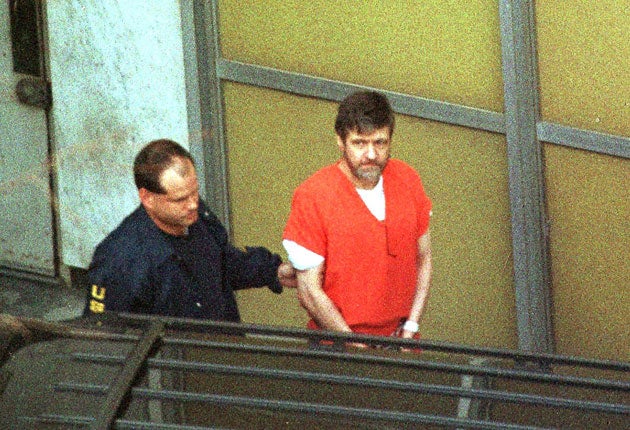His last published work was a 35,000-word "manifesto" that explained the motivation behind the 17-year terrorist campaign which made him one of America's most wanted men. Now, unperturbed by the fact that the manifesto's appearance led to his eventual identification, arrest and imprisonment for life, Theodore Kaczynski has decided to release his first book.
Compiled largely in his cell in a maximum-security facility at Florence, Colorado, the paperback Technological Slavery further explains the philosophy behind Kaczynski's attempts, through a long-running series of bomb attacks, to destroy Western civilisation.
The strangely coherent text has been co-authored by David Skrbina, a professor at the University of Michigan who has for several years taught classes on the Unabomber manifesto as part of an undergraduate course on the philosophy of technology.
It contains a collection of essays and correspondence with academics in which Kaczynski expands on the beliefs that inspired his campaign: namely that, to quote one passage, "the industrial revolution and its consequences have been a disaster for the human race" and that technological advances are destroying the planet and eroding human freedoms.
Dr Skrbina said that far from being the paranoid ravings of a madman, the book is meticulously authored. "It makes logical, clear, solid arguments," he says. "I haven't met the man face-to-face – all our contact has been via letters – but in our dealings there's been no sign of mental illness. He's lucid, rational and calm."
That is a different conclusion from the one reached by court psychiatrists who evaluated Kaczynski after the FBI arrested him at a remote cabin in Montana in 1996. They decided that he was a paranoid schizophrenic but was sufficiently fit to stand trial for murder.
Kaczynski's campaign of violence, in which he killed three people and injured more than 20, started in 1978. A former academic and maths whiz, he was apparently upset by the ongoing destruction of the natural world around his home, began sending pipe bombs to staff at airlines, university professors and the owners of computer stores. (He acquired the nickname Unabomber from the FBI case name, University and Airline Bomber.)
As the campaign progressed, and the devices became more effective – and deadly – Kaczynski began targeting professionals whom he held responsible for destroying the natural world. His final two victims, both of whom were killed, were Thomas Mosser, who made adverts for Exxon, and Gilbert Murray, a lobbyist who worked for the timber industry.
The attacks ended in 1995, when Kaczynski's manifesto was published by The New York Times and The Washington Post. He had contacted investigators, via anonymous letters, promising to stop the bombings if the document was printed.
The publication of the manifesto led to the Unabomber's arrest: his style of writing was recognised by his brother David, who swiftly contacted the FBI. As part of a plea bargain, Kaczynski was spared the death penalty, but was sentenced to life in prison without parole.
An updated version of the manifesto is included in Technological Slavery. According to Dr Skrbina, it provides an insight into the sort of ethical codes that terrorists use to justify their campaigns.
"I try to separate his crimes from his academic arguments," Dr Skrbina says. "I'm interested in philosophy. Now I certainly don't endorse the murders he committed, but if you are studying ethics then it's important to realise that there are many instances in which an individual can say, yes, there is an ethically justified basis for killing.
"Governments are, in effect, arguing that killing is justified whenever they start a war. In both the manifesto, and in his letters to me, which are also printed in the book, Kaczynski is, in effect, doing the same thing."

Join our commenting forum
Join thought-provoking conversations, follow other Independent readers and see their replies
0Comments